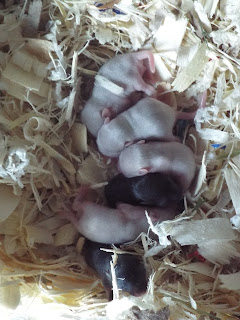After the birthing is complete and the parents have finished mating, mamma-gerbil will gather all her pups into a nest. She'll probably kick daddy-gerbil out of that nest for a day or two. It's possible he'll steal a pinkie or two for company. If mamma doesn't take them back after awhile, you might want to do it for her. Only after you've thoroughly washed your hands, however!
The female gerbil will likely move her kiddos from nest to nest and corner to corner over the first few days. This is normal, and she should eventually calm down. If she seems overly distracted or nervous, and is doing more digging and exploring than mothering, you may want to drape a towel over half the cage and leave the room she's in alone for awhile.
Whatever you do, don't mess with the cage! Taking dad out, putting cardboard in, moving it to a new room, etc., may cause mamma-gerbil to become even more stressed and neglect her pups.
If you'd like, you can begin handling the pups within a day or two of birth. I waited until they were about three days old. In any case, be sure to wash your hands! You might also want to distract mom and dad with some cardboard or treats. And I wouldn't suggest taking them out of the tank until five days or older.
Be careful while handling the pups. Blind and relatively immobile though they may be, you'll be surprised just how quickly they can go from resting in your palm to going skydiving. For this reason, it's best to keep your hands cupped so they can't get out, and/or to hold them close to the ground and over a soft surface like a pillow.
For the first few days, the pinkies will be just that: pink. This is my first litter of pups at about two or three days old.
By the time they're a week old, you'll probably be able to do your initial sexing of the babies. They'll have a bit of fuzz at this point. Females will have small dents at the armpits, sides of belly, and thighs. You may also be able to determine their colors. Here's what my pups looked like at this age:
Next we're at the 10-20 days stage. This is when the pups will have fur, will be getting more active, but will still have their eyes closed. If you've been handling them daily, they'll be quite comfortable with your hands. Be even more careful when holding them though, as they're more and more likely to jump out of your hold!
This is an important but also slightly stage in your handling of the babies. Now that they can see, they'll find you terrifying and strange, and be all sorts of jumpy and skittish. So be careful! But don't stop handling them. Try to work with them a few times a day, for a few minutes at each time.
Within a few days, the pups should have calmed down considerably, and started to recognize you again. This is the point where the pups are lots of fun to watch as they discover the world around them. You can slowly begin introducing in halves of toilet paper tubes and small boxes for them to play with. At this point they will also begin eating solid food. You can give them Cheerios, or sunflower seeds.
Weaning is about a two week process, and will be mostly finished by the time the pups are five weeks old. This is also the point that the second litter will probably arrive. You should also be able to more confidently sex them now.
You'll want to remove dad a couple days before you expect litter two, or you'll end up with a litter three. If you want, you can send some of the pups with him into a new tank. You can leave them with mom, but it's possible that she'll feel threatened and try to drive them out. My suggestion would be to put the boy pups with dad, but leave the girls with mom to help raise the next batch of pups.
At six weeks, you can place your pups. You can also introduce in other objects into the tank. Though still be careful of anything that could fall in crush them, or of wheels that they're just too little for yet. If you want to be on the safe side, I'd suggest waiting until eight weeks for those advancements.
As a side note, it is somewhat likely that you'll have a runt in at least one of your litters. He'll have a much harder time getting enough milk. If you want, you can try to supplement with kitten replacement milk and an eyedropper. Personally, I never had any success with this. The runt of my litter passed away at four weeks. But it's also perfectly possible that yours will be fine.
From 6-8 weeks and on, your little pups are pretty much adult gerbils, just extra cute!
For additional information, visit AGS page on breeding gerbils: http://agsgerbils.org/Learn/Gerbil_Care_Handbook/breeding.php#mating














No comments:
Post a Comment